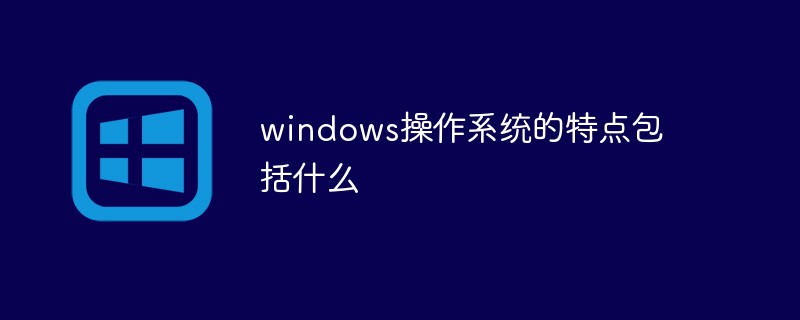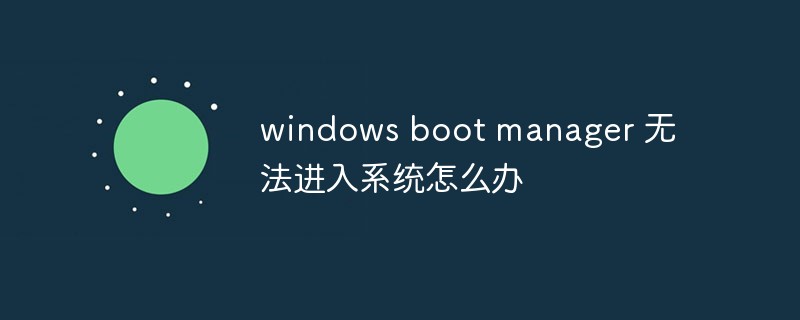The operating system is responsible for managing and controlling computer hardware and software resources. The operating system needs to handle basic tasks such as managing and configuring memory, determining the priority of system resource supply and demand, controlling input and output devices, operating the network, and managing the file system.

#The operating environment of this article: windows10 system, thinkpad t480 computer.
The operating system is responsible for managing and controlling computer hardware and software resources.
The operating system (Operation System, referred to as OS) is a computer program that manages and controls computer hardware and software resources. It is also the core and cornerstone of the computer system.
The computing operating system can be said to be very important to the computer. From the user's perspective, the operating system can schedule various resource blocks of the computer system, including software and hardware equipment, data information, etc. , the use of computer operating systems can reduce the work intensity of manual resource allocation, reduce the user's intervention in computing operations, and the computer's intelligent work efficiency can be greatly improved.
Secondly, in terms of resource management, if multiple users jointly manage a computer system, there may be conflicts in the information sharing between the two users.
In order to more reasonably allocate the various resource blocks of the computer and coordinate the various components of the computer system, it is necessary to give full play to the functions of the computer operating system and make an optimal use efficiency and degree of use of each resource block. Adjustments are made so that the needs of each user can be met.
Finally, with the assistance of computer programs, the operating system can abstractly handle various basic functions provided by computing system resources, display operating system functions to users in a visual way, and reduce the difficulty of using the computer.
The main functions of the operating system
The computing operating system can be said to be very important to the computer. From the user's point of view, the operating system can have a significant impact on the computer system. Various resource sectors carry out scheduling work, including software and hardware equipment, data information, etc. The use of computer operating systems can reduce the work intensity of manual resource allocation, and the user's intervention in computing operations is reduced, and the computer's intelligent work efficiency can be achieved A big improvement. Secondly, in terms of resource management, if multiple users jointly manage a computer system, there may be conflicts in the information sharing between the two users. In order to more reasonably allocate the various resource blocks of the computer and coordinate the various components of the computer system, it is necessary to give full play to the functions of the computer operating system and make optimal adjustments to the efficiency and degree of use of each resource block so that each user can All needs can be met. Finally, with the assistance of computer programs, the operating system can abstractly handle various basic functions provided by computing system resources, display operating system functions to users in a visual way, and reduce the difficulty of using the computer.
The operating system mainly includes the following functions:
①Process management, its work is mainly process scheduling. In the case of a single user and a single task, the processor is only for one user. Exclusively for one task, the work of process management is very simple. However, in the case of multi-programming or multi-user, when organizing multiple jobs or tasks, it is necessary to solve the problems of processor scheduling, allocation and recycling.
② Storage management is divided into several functions: storage allocation, storage sharing, storage protection, and storage expansion.
③Device management has the following functions: device allocation, device transmission control, and device independence.
④File management: file storage space management, directory management, file operation management, and file protection.
⑤Job management is responsible for processing any requirements submitted by users.
Related recommendations: "Programming Video"
The above is the detailed content of What is the operating system responsible for managing the computer?. For more information, please follow other related articles on the PHP Chinese website!
 世界上的三大操作系统是什么Aug 22, 2022 pm 04:24 PM
世界上的三大操作系统是什么Aug 22, 2022 pm 04:24 PM三大操作系统:1、windows,是微软公司以图形用户界面为基础研发的操作系统,主要运用于计算机、智能手机等设备。2、macOS,是一套由苹果开发的运行于Macintosh系列电脑上的操作系统,是基于XNU混合内核的图形化操作系统。3、linux,是一种免费使用和自由传播的类UNIX操作系统,是一个基于POSIX的多用户、多任务、支持多线程和多CPU的操作系统。
 vivo手机是什么系统Jul 04, 2022 am 11:10 AM
vivo手机是什么系统Jul 04, 2022 am 11:10 AMvivo手机是“Funtouch OS”和“OriginOS”系统;2020年11月18日之前,vivo手机搭载的都是“Funtouch OS”系统,2020年11月18日“OriginOS”操作系统发布之后,vivo手机搭载的就是“OriginOS”操作系统了,首款搭载该系统的是“vivo X60”系列手机。
 windows操作系统的特点包括什么Sep 28, 2020 pm 12:02 PM
windows操作系统的特点包括什么Sep 28, 2020 pm 12:02 PMwindows操作系统的特点包括:1、图形界面;直观高效的面向对象的图形用户界面,易学易用。2、多任务;允许用户同时运行多个应用程序,或在一个程序中同时做几件事情。3、即插即用。4、出色的多媒体功能。5、对内存的自动化管理。
 什么是闭环控制系统Jul 04, 2022 pm 04:18 PM
什么是闭环控制系统Jul 04, 2022 pm 04:18 PM闭环控制系统是控制系统的一种类型,能够把系统输出量的一部分或全部通过一定方法和装置反送回系统的输出端,再将反馈信息与原输入信息进行比较,将比较的结果施加于系统进行控制,避免系统偏离预定目标。
 什么是操作系统?它的作用是什么?Dec 07, 2020 pm 03:04 PM
什么是操作系统?它的作用是什么?Dec 07, 2020 pm 03:04 PM操作系统是管理计算机硬件与软件资源的计算机程序,是控制和管理计算机软硬件资源,以尽量合理有效的方法组织多个用户共享多种资源的程序集合。操作系统的作用:1、管理系统中的各种资源;2、为用户提供良好的界面。从计算机用户的角度来说,操作系统体现为其提供的各项服务;从程序员的角度来说,其主要是指用户登录的界面或者接口;从设计人员的角度来说,就是指各式各样模块和单元之间的联系。
 miui是什么系统Oct 27, 2022 pm 03:59 PM
miui是什么系统Oct 27, 2022 pm 03:59 PMmiui是小米公司旗下基于Android系统深度优化、定制、开发的第三方手机操作系统。MIUI在Android系统基础上,针对中国用户进行了深度定制,专为小米智能手机设计,包含红米系列,同时支持手机物联。在隐私方面,miui系统会记录各应用的一切敏感行为,并呈现出来;当应用使用相机、录音、定位权限时,系统会给出明显提示,点击提示即可进行管控。
 windows boot manager 无法进入系统怎么办Nov 13, 2022 pm 02:06 PM
windows boot manager 无法进入系统怎么办Nov 13, 2022 pm 02:06 PMwindows boot manager无法进入系统的解决办法:1、开机按DEL键;2、进BIOS设置光盘或U盘引导电脑进WinPE;3、使用Diskgenius重建主引导记录,并重启电脑;4、重装操作系统。
 电脑开机快慢和什么有关Aug 12, 2022 am 10:47 AM
电脑开机快慢和什么有关Aug 12, 2022 am 10:47 AM影响电脑开机快慢的因素:1、操作系统;如果操作系统太过庞大,开机要加载的文件、服务、软件过多就会让开机速度变慢。2、硬件;硬件对于开机的影响主要是CPU、内存容量和硬盘速度,主板中预存的引导程序会引导CPU通过主板从硬盘中调用启动系统的数据,然后在内存空间内运行,因而CPU、内存大小和硬盘直接影响电脑开机的速度。3、加载项;加载项越多,硬盘要加载的东西就越多,开机速度就越慢。

Hot AI Tools

Undresser.AI Undress
AI-powered app for creating realistic nude photos

AI Clothes Remover
Online AI tool for removing clothes from photos.

Undress AI Tool
Undress images for free

Clothoff.io
AI clothes remover

AI Hentai Generator
Generate AI Hentai for free.

Hot Article

Hot Tools

SAP NetWeaver Server Adapter for Eclipse
Integrate Eclipse with SAP NetWeaver application server.

EditPlus Chinese cracked version
Small size, syntax highlighting, does not support code prompt function

Dreamweaver Mac version
Visual web development tools

Notepad++7.3.1
Easy-to-use and free code editor

VSCode Windows 64-bit Download
A free and powerful IDE editor launched by Microsoft






